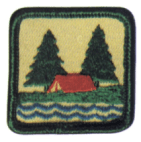Camping (microframework)
Camping is a web application microframework written in Ruby. Camping's source code is less than 4 KB in size.
 | |
| Original author(s) | "Why the lucky stiff" |
|---|---|
| Developer(s) | "Why the lucky stiff" |
| Stable release | 2.1
/ August 19, 2010 |
| Operating system | Cross-platform |
| Size | 4 KB |
| Available in | Ruby |
| Type | Web application framework |
| License | MIT License |
| Website | camping |
It was created and updated by the programmer known as "Why the lucky stiff" until version 1.5. Around that time Why's focus shifted towards Hackety Hack and related project Shoes. Why provided Judofyr (a major contributor) with admin access on rubyforge.org and other sites. Judofyr took over as de facto head of the project.[1] Since then Camping has been a community driven framework with contributions from many people and a small but helpful community. While Judofyr is sometimes seen as a leader, he's insisted camping be governed by consensus on the (now defunct) mailing list. Why's eventual departure solidified the project as being communally run, and is notable for being one of the few former Why projects to be taken over by the community before Why's disappearance. Current editions of Camping are available from GitHub and are distributed as a RubyGem.
Overview
Camping stores a complete fledgling web application in a single file, like a bundle of many small CGI scripts, but organizes it as a model–view–controller application as Ruby on Rails does. Camping applications can stand alone, meet niche requirements as 'the small wheels' that serve larger setups, or easily be ported to Rails.
Installation
For a basic installation, Camping only requires Rack (0.3 or higher) and (if you want to write HTML) Markaby (0.5 or higher), both available as Rubygems. Further details can be found on the Camping wiki. To use a database (SQLite by default) you'll also need the ActiveRecord and Sqlite3-ruby Rubygems. Run camping yourappname.rb to launch the application on port 3301.
Tutorials
The introductory tutorial builds a minimal unstyled wiki (download working example wiki code), and the Camping examples contains a tiny but fully functioning css-styled blog. Earlier Camping 1.5 examples will either run without modification or require only slight adjustments to run under Camping 2.0.
See also
References
- StackOverflow answer explanation referring to Judofyr's ongoing maintenance
External links
- Camping 2.0.* on GitHub
- Camping wiki on GitHub
- Camping mailing list: messages by thread
- Why Camping Matters by Nathaniel Talbott at rubyconf 2007
- RubyOnRails podcast on Camping at Archive.today (archived April 15, 2013)
- an archive of things that Why created at the Wayback Machine (archived March 2, 2010)
- Wild and Crazy Metaprogramming with Camping
- Why's poignant guide to Ruby
